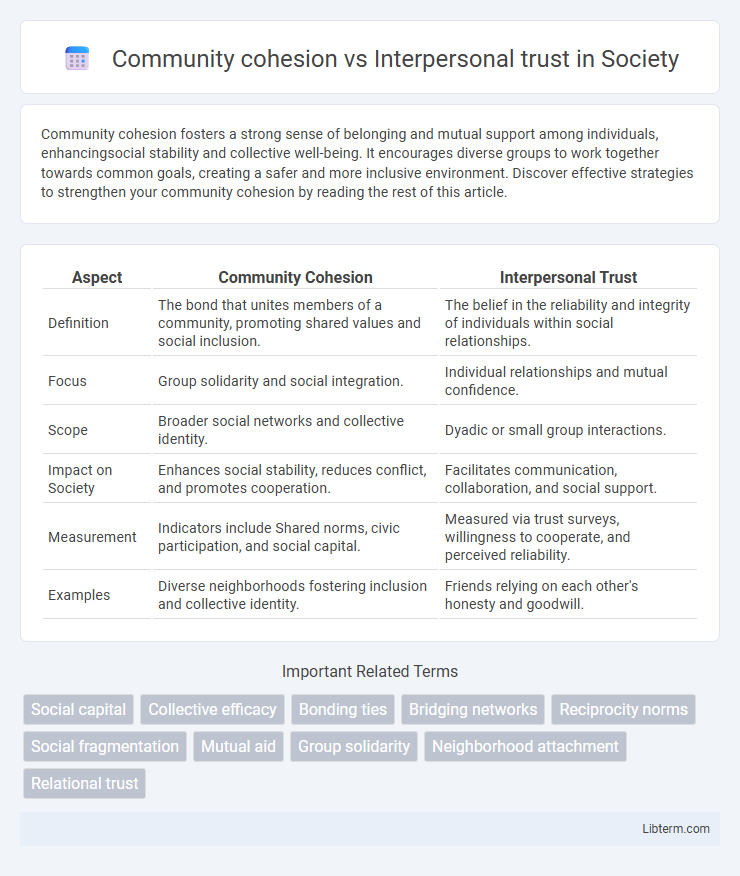Community cohesion fosters a strong sense of belonging and mutual support among individuals, enhancingsocial stability and collective well-being. It encourages diverse groups to work together towards common goals, creating a safer and more inclusive environment. Discover effective strategies to strengthen your community cohesion by reading the rest of this article.
Table of Comparison
| Aspect | Community Cohesion | Interpersonal Trust |
|---|---|---|
| Definition | The bond that unites members of a community, promoting shared values and social inclusion. | The belief in the reliability and integrity of individuals within social relationships. |
| Focus | Group solidarity and social integration. | Individual relationships and mutual confidence. |
| Scope | Broader social networks and collective identity. | Dyadic or small group interactions. |
| Impact on Society | Enhances social stability, reduces conflict, and promotes cooperation. | Facilitates communication, collaboration, and social support. |
| Measurement | Indicators include Shared norms, civic participation, and social capital. | Measured via trust surveys, willingness to cooperate, and perceived reliability. |
| Examples | Diverse neighborhoods fostering inclusion and collective identity. | Friends relying on each other's honesty and goodwill. |
Defining Community Cohesion
Community cohesion refers to the strength of relationships and the sense of solidarity among members within a community, emphasizing shared values, mutual respect, and social inclusion. It involves collective engagement and cooperation that promote stability and reduce social fragmentation. Unlike interpersonal trust, which centers on individual belief in others' reliability, community cohesion highlights broader societal bonds and collective identity essential for community resilience.
Understanding Interpersonal Trust
Interpersonal trust is essential for building strong community cohesion as it fosters cooperation, reduces social friction, and enhances collective resilience. Understanding interpersonal trust involves recognizing its basis in perceived reliability, honesty, and shared values among community members. High levels of interpersonal trust correlate with increased social capital, promoting a supportive environment where individuals feel safe to engage and collaborate.
Key Differences Between Cohesion and Trust
Community cohesion refers to the strength of relationships and the sense of solidarity among members within a group, emphasizing shared values, social integration, and collective identity. Interpersonal trust, however, is the confident expectation individuals have regarding the reliability and integrity of others in one-to-one interactions. While cohesion highlights the broader social fabric and collective belonging, interpersonal trust centers on personal belief in others' honesty and dependability.
The Role of Social Networks
Social networks play a crucial role in enhancing community cohesion by facilitating interactions that build shared norms and collective identity. Interpersonal trust is strengthened through repeated social exchanges within these networks, creating a foundation for cooperation and mutual support. The density and diversity of social ties directly influence the level of trust and solidarity in a community, impacting its overall social capital.
Impact on Social Capital
Community cohesion enhances collective identity and shared norms, significantly strengthening social capital by facilitating cooperation and mutual support among members. Interpersonal trust directly increases social capital by enabling more reliable and reciprocal relationships, which improves social networks and resource exchange. Both factors synergistically impact social capital, where cohesive communities foster trust that underpins effective social collaboration and resilience.
Cultural Influences on Cohesion and Trust
Cultural influences significantly shape community cohesion and interpersonal trust by framing social norms, values, and communication styles that either strengthen or weaken communal bonds. Collectivist cultures tend to foster higher community cohesion through shared goals and mutual support, while individualistic cultures emphasize personal autonomy, affecting the level of interpersonal trust differently. Understanding these cultural dimensions enables targeted strategies to enhance social integration and trust within diverse communities.
Measuring Community Cohesion
Measuring community cohesion involves assessing shared values, social networks, and a sense of belonging among residents to evaluate the strength and unity within a community. Tools such as surveys on social participation, trust in neighbors, and collective efficacy provide qualitative and quantitative data reflecting interpersonal trust levels and the overall cohesion. High community cohesion often correlates with elevated interpersonal trust, fostering cooperative behaviors and resilience in social groups.
Assessing Levels of Interpersonal Trust
Assessing levels of interpersonal trust involves measuring the extent to which individuals believe others in their community are reliable and honest, directly impacting community cohesion. High interpersonal trust correlates with increased collaboration, reduced social conflict, and stronger social networks that underpin cohesive communities. Tools like surveys, trust scales, and behavioral experiments quantify trust levels to inform policies aimed at enhancing social harmony and collective well-being.
Challenges in Building Cohesion vs Trust
Building community cohesion often faces challenges such as cultural diversity, socioeconomic disparities, and historical conflicts that hinder collective identity and shared goals. Interpersonal trust struggles with issues like lack of consistent communication, perceived betrayal, and social fragmentation, making it difficult to establish reliable and enduring relationships. These obstacles highlight the complex interplay between societal structures and individual interactions in fostering unified communities.
Strategies for Fostering Both Elements
Strategies for fostering community cohesion and interpersonal trust include promoting inclusive social activities that encourage diverse group interactions and shared goals. Establishing transparent communication channels and collaborative decision-making processes enhances mutual understanding and accountability among community members. Implementing conflict resolution programs and trust-building workshops further strengthens relationships and supports long-term social harmony.
Community cohesion Infographic

 libterm.com
libterm.com